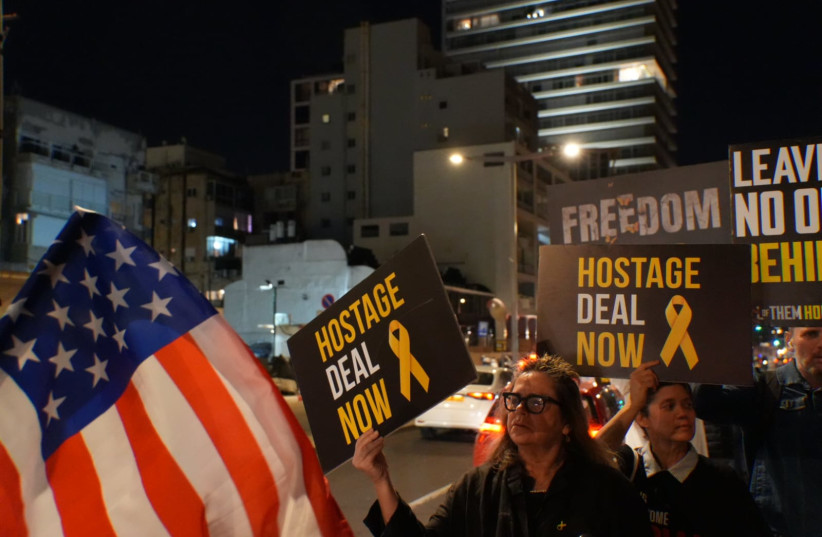“Israeli society is in a somber mood in the lead up to Passover,” said Rabbi David Stav, the chief rabbi of the city of Shoham and the co-founder and chairman of Tzohar, an organization that seeks to make Jewish life accessible to secular Israelis by promoting moderate rabbinic leadership and public policy.
“The hostages are the first reason [for this somber mood], the tens of thousands of families who have not returned to their homes [because of the Israel-Hamas war] is the second reason, the lack of a clear victory in Gaza is the third reason, and perhaps the main reason is the uncertainty surrounding the question of where the country is headed in the coming years and months, with Iran and other factors,” Stav explained.
The hostages “exemplify, maybe more than anything else, the gloomy state we are in, celebrating a holiday of liberation with people in captivity,” he said, adding that while many feel challenged by this prospect, Passover has always been a holiday of mixed feelings.
“The Passover Haggadah confronts us with mixed feelings from the very beginning. Anyone who thinks that the Haggadah is only a story of victory, does not know the Haggadah,” Stav said.
We start the Seder with the splitting of matzah, the bread of poverty, saying “now we are slaves, next year free people. At the Seder we say we are still slaves, but if we are slaves, why are we celebrating?” he asked.
“The answer is that despite the fact that we experienced liberation, and that we were given the right to freedom 3,300 years ago, that doesn’t mean we always use that right, and it doesn’t mean that the political and social circumstances are such that we will always be free people,” he said, mentioning the Prisoners of Zion and the Holocaust as examples.

Passover celebrates the right to be free
“But we will still celebrate Passover – because we have received the right to be free,” he explained.
Because freedom is such an important gift, we are having such a hard time with it this year, “when we feel there are hundreds and thousands of people who are not privileged to have that freedom this year,” explained Stav.
“We can’t let the pain and grief damage and dampen the gift” of freedom, he said.
There are numerous ways to create space to honor the hostages at the Seder this year, said the Tzohar leader, who gave several specific examples of how to do this.
First, “when we break the matzah in two, I suggest saying: ‘we break the matzah in two in order to also say that our heart is broken, just like the broken matzah. We break the matzah to say, yes, we have been liberated, but our liberation is incomplete. And so, we miss all of the hostages, and pray and want so desperately for all of them to come home.’”
Second, when we speak of the four sons, “there is a famous saying of the Lubavitcher Rebbe about the son who didn’t come to the table. He meant the son who did not come because he stopped being Jewish, or forgot his Judaism, or because he is fighting with his family,” said Stav. “Today we have children who did not come to the table not because they are fighting and not because they don’t want to, but because someone is not allowing them to. We want to mention that child,” he said.
The third point to mention the hostages is when pouring the fifth cup, also known as Elijah’s cup, Stav said. We pour the cup for the words “and I brought you,” and that is an opportunity to ask that God will bring them.
The rabbi also recommended that those who eat eggs dipped in salt water as a sign of the Passover sacrifice also mention the sacrifices of the last six months. “We ask to show, in this small act of eating an egg dipped in salt water, the mourning for them,” he said.
Stav gave additional words of encouragement to those feeling very challenged by the prospect of facing the holiday. “To my brothers and sisters, families of those held hostage, bereaved families, displaced families, the families of those injured, and to the injured,... the things that the people of Israel have been carrying for thousands of years are hope and faith in our good future,” he said.
“We know that God spoke good to Israel, we know that we are secured by God, we know we belong to a world of good and that we will do good. Even if it is hard and even if things get worse and there are other troubles on the way, we will win with the help of God.”
When asked what it means to win, given the current situation, Stav reminisced about a recent tour he took in the Gaza border region. He asked a resident of Sa’ad what it would mean to win. He said that the resident answered him: “when I go back to growing carrots and potatoes up until the border fence, that is victory,” and this message also resonated with him.
“What will determine if we have won or not is if we go back and settle the Negev, if we go back and grow potatoes and carrots, if the people of Israel go back and settle, and tours; if the people of Israel increase immigration to Israel,” he said.
“I am not looking for a picture of victory of [Hamas leader Yahya] Sinwar dead or alive, that is meaningless.”
Stav also thanked the Jews who live abroad and came to visit Israel during the war and encouraged them to consider making aliyah, especially in light of recent antisemitism abroad.
“The land is waiting for you, needs you – and, God willing, together with you, we will win.”
